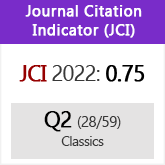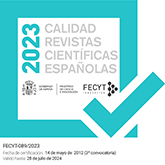La sphragís de las Metamorfosis de Ovidio (XV 871-879). Metempsicosis, apoteosis y perdurabilidad literaria
DOI:
https://doi.org/10.3989/emerita.2016.13.1503Palabras clave:
Ovidio, Metamorfosis, sphragís, metempsicosis, apoteosis, HoracioResumen
La predicción que de su propia inmortalidad hace Ovidio en la sphragís de las Metamorfosis ha sido entendida como una última transformación equiparable, por su dualismo, a la metempsicosis y a la apoteosis. Un examen de las causas de estos procesos permite, sin embargo, poner de relieve la especificidad de la perdurabilidad literaria, que es producto del favor de los lectores y no de una ley natural, como la metempsicosis, ni de una merced de los dioses, como la apoteosis.
Descargas
Citas
Albrecht, M. von 1971: «Der verbannte Ovid und die Einsamkait des Dichters im frühen XIX. Jahrhundert. Zum Selbstverständniss Franz Grillparzers und Aleksandr Puskins», Arcadia 6, pp. 16-43.
Albrecht, M. von 1988: «Les dieux et la religion dans les Métamorphoses d' Ovide», en Porte, D. y Néraudau, J. P. (eds.), Hommages à Henri Le Bonniec. Res sacrae , Bruselas, pp. 1-9.
Alfonsi, L. 1958: «L'inquadramento filosofico delle Metamorfosi», en Herescu, N. I. (ed.), Ovidiana. Recherches sur Ovide, París, pp. 265-272.
Álvarez, C. e Iglesias, R. M. 1995: Ovidio. Metamorfosis, Madrid.
Anderson, W. S. 1963: «Multiple Change in the Metamorphoses », TAPhA 94, pp. 1-27. http://dx.doi.org/10.2307/283631
Barchiesi, A. 1989: «Voci e istanze narrative nelle Metamorfosi di Ovidio», MD 23, pp. 55-97. http://dx.doi.org/10.2307/40235940
Barchiesi, A. 2002: «Narrative technique and narratology in the Metamorphoses », en Hardie, P. (ed.), The Cambridge Companion to Ovid , Cambridge, pp. 180-199 http://dx.doi.org/10.1017/ccol0521772818.013
Bethe, E. 1904: «Ovid und Nikander», Hermes 39, pp. 1-14.
Bömer, F. 1976: P. Ovidius Naso. Metamorphosen. Buch VI-VII , Heidelberg.
Bömer, F. 1986: P. Ovidius Naso. Metamorphosen. Buch XIV-XV , Heidelberg.
Ciccarelli, I., 1997: «Ovidio, Tristia 4, 10 e i topoi della sphragís », Aufidus 32, pp. 61-92.
Coleman, R. 1971: «Structure and Intention in the Metamorphoses », CQ 65, pp. 461-477. http://dx.doi.org/10.1017/S0009838800033644
Crahay, R. y Hubaux, J. 1958: «Sous le masque de Pythagore: à propos du livre 15 des Métamorphoses », en Herescu, N. I. (ed.), Ovidiana. Recherches sur Ovide, París, pp. 283-300.
Curran, L. C. 1972: «Transformation and Anti-Augustanism in Ovid's Metamorphoses », Arethusa 5, pp. 71-91.
Davis, N. G. 1980: «The Problem of Closure in a Carmen Perpetuum : Aspects of Thematic Recapitulation in Ovid Metamorphoses 15», GB 9, pp. 123-132.
D'Elia, S. 1959: Ovidio, Nápoles. PMid:13639574
Due, O. S. 1974: Changing Forms. Studies in the Metamorphoses of Ovid, Copenhague. PMid:1136790
Enterline, L. 2000: The Rhetoric of the Body from Ovid to Shakespeare, Cambridge. http://dx.doi.org/10.1017/CBO9780511483561
Erbse, H. 2003: «Beobachtungen über die Funktion der Metamorphose bei Ovid», Hermes 131, pp. 323-349.
Farrell, J. 1999: «The Ovidian Corpus : Poetic Body and Poetic Text», en Hardie, P., Barchiesi, A. y Hinds, S. (eds.), Ovidian Transformations. Essays on Ovid's Metamorphoses and its Reception, Cambridge, pp. 127-141.
Feeney, D. 1991: The Gods in Epic. Poets and Critics of the Classical Tradition, Oxford.
Feldherr, A. 2010: Playing Gods. Ovid's Metamorphoses and the Politics of Fiction, Princeton. http://dx.doi.org/10.1515/9781400836543
Fränkel, H. 1945: Ovid: A Poet Between two Worlds, Berkeley - Los Ángeles.
Galinsky, G. K. 1975: Ovid's Metamorphoses. An Introduction to the Basic Aspects, Berkeley-Los Ángeles.
Galinsky, G. K. 1996: Augustan Culture. An interpretive introduction, Princeton.
Gärtner, T. 2004: «Die Bedeutung der Buchgliederung für die kompositionelle Gestaltung der Metamorphosen Ovids», Studia Humaniora Tartuensia 5 (A.3), pp. 1-68 < http://www.ut.ee/klassik/sht/2004/gaertner2.pdf> (04/12/2014).
Gillespie, S . 2010: «Literary Afterlives: Metempsychosis from Ennius to Jorge Luis Borges», en Hardie, P. y Moore, H. (eds.), Classical Literary Careers and their Reception , Cambridge, pp. 209-225. http://dx.doi.org/10.1017/cbo9780511778872.014
Hardie, P. 1993: The Epic Successors of Virgil: A Study in the Dinamics of a Tradition, Cambridge.
Hardie, P. 1995: «The Speech of Pythagoras in Ovid Metamorphoses 15: Empedoclean Epos», CQ 45, pp. 204-214. http://dx.doi.org/10.1017/S000983880004180X
Hardie, P. 1997: «Questions of Authority: The Invention of Tradition in Ovid Metamorphoses 15», en Habinek, T. y Schiesaro, A. (eds.), The Roman Cultural Revolution, Cambridge, pp. 182-198.
Hardie, P. 1999: «Ovid into Laura. Absent Presences in the Metamorphoses and Petrarch's Rime Sparse », en Hardie, P., Barchiesi, A. y Hinds, S. (eds.), Ovidian Transformations. Essays on Ovid's Metamorphoses and its Reception, Cambridge, pp. 254-270.
Hardie, P. 2002: Ovid's Poetics of Illusion, Cambridge.
Harrison, S. J. 2007: Generic Enrichment in Vergil and Horace, Oxford. http://dx.doi.org/10.1093/acprof:oso/9780199203581.001.0001
Hexter, R. J. 1999: «Ovid's Body», en Porter, J. J. (ed.), The Construction of the Classical Body, Ann Arbor, pp. 327-354. PMid:10192675
Hexter, R. J. 2002: «Ovid in the Middle Ages», en Weiden Boyd, B. (ed.), Brill's Companion to Ovid, Leiden-Boston, pp. 413-442.
Hinds, S. E. 1987: The Metamorphosis of Persephone: Ovid and the Self-Conscious Muse , Cambridge.
Hoces Sánchez, M. C. 2010: «Los últimos versos de las Metamorfosis de Ovidio: una sphragís con ecos horacianos», en Luque Moreno, J., Rincón González, M. D. y Velázquez, I. (coords.), Dulces Camenae. Poética y Poesía Latinas, Granada- Jaén, pp. 109-121.
Holzberg, N. 2002: Ovid: The Poet and His Work , Ithaca.
Johnson, W. R. 1970: «The Problem of the Counter-classical Sensibility and Its Critics», CSCA 3, pp. 123-151. http://dx.doi.org/10.2307/25010603
Korn, O. y Ewahld, R. 1898: Die Metamorphosen des P. Ovidius Naso. Buch VIIIXV, Berlín.
Kovacs, D. 1987: «Ovid, Metamorphoses 1.2», CQ 37, pp. 458-465. http://dx.doi.org/10.1017/S0009838800030664
Lafaye, G. 1904: Les Métamorphoses d'Ovide et leurs modèles grecs, París.
Ledentu, M. 2011: «La voix du poète et ses mises en scène dans les Métamorphoses d'Ovide», en Raymond, E. (ed.), Vox poetae. Manifestations auctoriales dans l'épopée gréco-latine, París, pp. 157-181.
Lida de Malkiel, M. R. 1952: La idea de la fama en la Edad Media castellana, México.
Lieberg, G. 1970: «Apotheose und Unsternblichkeit in Ovids Metamorphosen », en Albrecht, M. von. y Heck, E. (eds.), Silvae. Festschrift für Ernst Zinn, Tubinga, pp. 125-135.
Little, D. A. 1970: «The Speech of Pythagoras in Metamorphoses 15 and the Structure of the Metamorphoses », Hermes 98, pp. 340-360.
Ludwig, W. 1965: Struktur und Einheit der Metamorphosen Ovids, Berlín.
Martínez Astorino, P. 2009: La apoteosis en las Metamorfosis de Ovidio: función estructural y valor semántico, La Plata.
Miller, J. F. 1993: «Ovidian Allusion and the Vocabulary of Memory», MD 30, pp. 153-164.
Miller, J. F. 1994: «The Memories of Ovid's Pythagoras», Mnemosyne 47, pp. 473-487. http://dx.doi.org/10.1163/156852594X00230
Moulton, C. 1973: «Ovid as Anti-Augustan. Met. 15.843-879», CW 67, pp. 4-7.
Myers, K. S. 1994: Ovid's Causes: Cosmogony and Aetiology in the Metamorphoses , Ann Arbor.
Nisbet, R. G. M. 1982: «Great and Lesser Bear (Ovid, Tristia 4.3)», JRS 72, pp. 49-56.
O'Hara, J. J. 2007: Inconsistency in Roman Epic. Studies in Catullus, Lucretius, Vergil, Ovid and Lucan, Cambridge. http://dx.doi.org/10.1017/CBO9780511618567
Otis, B. 1938: «Ovid and the Augustans», TAPhA 69, pp. 188-229. http://dx.doi.org/10.2307/283176
Otis, B. 1966: Ovid as an Epic Poet, Cambridge. PMid:5916876
Paratore, E. 1959: «L'evoluzione della sphragís dalle prime alle ultime opere di Ovidio», en AA. VV., Atti del Convegno Internazionale Ovidiano. Sulmona, maggio 1958, I, Roma, pp. 173-203.
Petersen, W. T. 1877: Quaestiones Ovidianae, Kiel.
Petersmann, M. 1976: Die Apotheosen in den Metamorphosen Ovids, Graz. PMid:825755
Rieks, R. 1980: «Zum Aufbau von Ovids Metamorphosen», WJA 6, pp. 85-103.
Río Torres-Murciano, A. 2009: «Las secuelas del fortunati ambo (Verg., Aen. 446-449): epopeya e imperio», Emerita 77, pp. 295-315. http://dx.doi.org/10.3989/emerita.2009.v77.i2.316
Rosati, G. 1979: «L'esistenza letteraria. Ovidio e l'autocoscienza della poesia», MD 2, pp. 101-136. http://dx.doi.org/10.2307/40235721
Rosati, G. 2002: «Narrative Techniques and Narrative Structures in the Metamorphoses», en Weiden Boyd, B. (ed.), Brill's Companion to Ovid, Leiden-Boston, pp. 271-304.
Segal, C. P. 1969: «Myth and Philosophy in the Metamorphosis : Ovid's Augustanism end the Augustan Conclusion of Book XV», AJPh 90, pp. 257-292.
Solodow, J. B. 1988: The World of Ovid's Metamorphoses, Chapel Hill.
Segal, C. P. 2001: «Intertextuality and Immortality: Ovid, Pythagoras and Lucretius in Metamorphoses 15», MD 46, pp- 63-101.
Spahlinger, L. 1996: Ars latet arte sua. Untersuchungen zur Poetologie in den Metamorphosen Ovids, Stuttgart. http://dx.doi.org/10.1515/9783110954272
Stephens, W. C. 1957: The Function of Religious and Philosophical Ideas in Ovid's Metamorphoses, Princeton.
Stewart, D. J. 1967: «The poet as bird in Aristophanes and Horace», CJ 62, pp. 357-361.
Swanson, R. A. 1958: «Ovid's Pythagorean Essay», CJ 54, pp. 21-24.
Tatum, J. 1973: «Non usitata tenui ferar », AJPh 94, pp. 4-25. http://dx.doi.org/10.2307/294035
Tissol, G. 1997: The Face of Nature: Wit, Narrative, and Cosmic Origins in Ovid's Metamorphoses, Princeton.
Todini, U. 1992: L'altro Omero. Scienza e storia nelle Metamorfosi di Ovidio, Nápoles.
Veremans, J. 2006: «La sphragís dans les Amores d'Ovide: une aproche stylistique et rhétorique», Latomus 65, pp. 378-387.
Verheyk, H. 1774: Antonini Liberalis Transformationum Congeries interprete Guilielmo Xylandro, Leiden.
Viarre, S. 1964: L'image et la pensée dans les Métamorphoses d'Ovide, París.
Vollgraff, C. W. 1909: Nikander und Ovid, Groninga.
Wheeler, S. 1999: A Discourse of Wonders. Audience and Performance in Ovid's Metamorphoses, Filadelfia.
Wheeler, S. 2000: Narrative Dynamics in Ovid's Metamorphoses, Tubinga.
Wickkiser, B. L. 1999: «Famous Last Words: Putting Ovid's Sphragis Back into the Metamorphoses », MD 42, pp. 113-142. http://dx.doi.org/10.2307/40236140
Wilkinson, L. P. 1955: Ovid Recalled, Cambridge.
Zinn, E. 1956: «Die Dichter des alten Rom und die Anfänge des Weltgedichts», A&A 5, pp. 7-26.
Zumwalt, N. 1977: «Fama Subversa : Theme and Structure in Ovid Metamorphoses 12», CSCA 10, pp. 209-222. http://dx.doi.org/10.2307/25010720
Descargas
Publicado
Cómo citar
Número
Sección
Licencia
Derechos de autor 2016 Consejo Superior de Investigaciones Científicas (CSIC)

Esta obra está bajo una licencia internacional Creative Commons Atribución 4.0.
© CSIC. Los originales publicados en las ediciones impresa y electrónica de esta Revista son propiedad del Consejo Superior de Investigaciones Científicas, siendo necesario citar la procedencia en cualquier reproducción parcial o total.Salvo indicación contraria, todos los contenidos de la edición electrónica se distribuyen bajo una licencia de uso y distribución “Creative Commons Reconocimiento 4.0 Internacional ” (CC BY 4.0). Puede consultar desde aquí la versión informativa y el texto legal de la licencia. Esta circunstancia ha de hacerse constar expresamente de esta forma cuando sea necesario.
No se autoriza el depósito en repositorios, páginas web personales o similares de cualquier otra versión distinta a la publicada por el editor.














